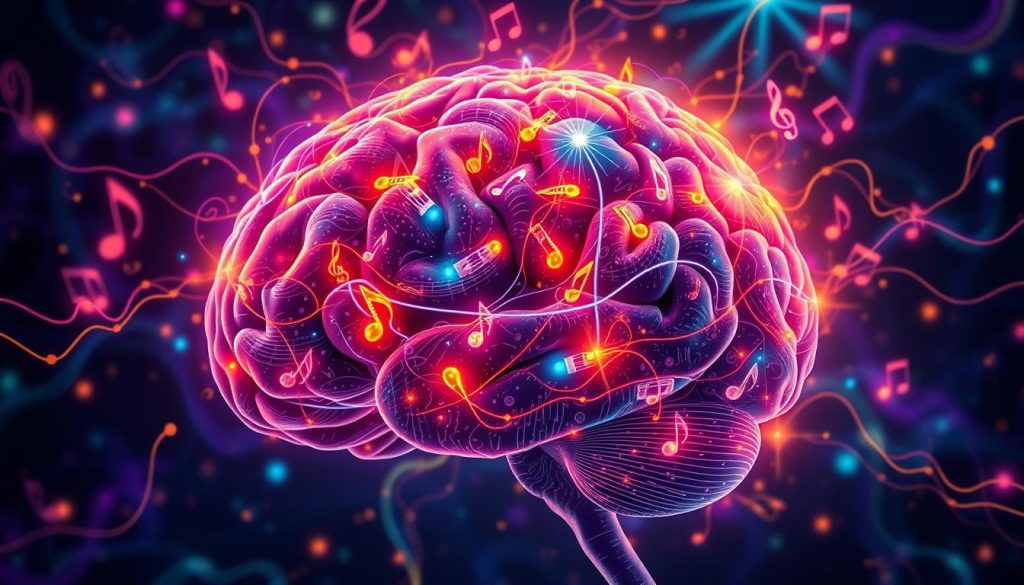The curious relationship between music and emotional memory.
Music is a universal language that touches our hearts and minds deeply. It’s a key part of music therapy and emotional memory. Studies show music can change our brains, helping with learning and feeling.
Anúncios
Music can make us feel better and connect with our emotions. It’s especially important for kids, helping them grow in many ways. Music also helps people with different health issues, showing its power.
Let’s dive into how music and emotional memory are linked. We’ll see how music can help our brains and feelings. This knowledge can help us live better lives, filled with joy and connection.
Understanding Music and Emotional Memory: A Powerful Connection
Music deeply affects our emotions and memory formation. Studies in neuroscience reveal that music touches many brain areas. These include parts for sensing, thinking, remembering, and feeling.
Anúncios
Many things, like sound quality, speed, and personal stories, shape this bond between music and emotions.
A study in BMC Neuroscience looked into how emotions impact musical memory. It showed that about 50% of people without perfect pitch could sing popular songs correctly. This proves that music and emotions are closely tied, with music being a key to unlocking emotional memories.
Different music types can stir different emotions in us. For instance, music in major keys can also evoke sadness. This shows how complex our emotional responses to music can be.
Also, we tend to remember music from our teens more than music from other times. This is known as the reminiscence bump for music from adolescence.
Understanding the bond between music and emotions is key to better memory formation and emotional health. Music can lift our mood, lower stress, and bring back strong memories. As research digs deeper, we’ll learn more about how neuroscience shapes our feelings and memory formation.
Why Certain Songs Trigger Specific Memories
Music deeply affects our emotions and how we remember things. Studies show it can bring back vivid memories in people with dementia, even when they’ve lost a lot of their memory. This is because music is closely tied to our emotional healing, and our brain’s emotional areas light up when we hear music.
The mere exposure effect tells us we like music we know well because we’ve heard it a lot. This is why most people remember their teens and early twenties the most. Music preference usually starts in the middle teenage years and stays with us, affecting our mood.
Research also shows that picking our own music can bring back positive memories in dementia patients. In fact, music can really bring back memories in people with dementia. It’s seen as a special way to bring back memories in older adults with Alzheimer’s disease.
- Music can improve learning and memory by increasing activity in the brain’s emotional memory processing regions.
- Music can evoke powerful emotions and create meaningful experiences, leading to stronger memory formation.
- Music can be used as a therapeutic tool for emotional healing, particularly in individuals with mental health conditions such as PTSD or depression.
| Age Range | Memory Formation |
|---|---|
| 10-30 years old | Peak memory formation, associated with the “reminiscence bump” |
| Middle teenage years | Music preference typically develops, influencing emotional well-being |
The Neuroscience of Musical Memories
Music processing in the brain is complex. It involves areas like the auditory cortex, hippocampus, and amygdala. Research shows that music can make these brain functions easier to access, especially when it comes to music-induced brain network oscillations. The neuroscience behind musical memories shows that music is processed in specific frequency bands. These bands can be influenced by the music an individual prefers.
Studies have shown that music can make the hippocampus and amygdala more active. These areas are key for brain function and emotional processing. This can lead to better music processing and cognitive function. For example, a team from the Georgia Institute of Technology and the University of Colorado Boulder found that music can help people remember new emotional experiences.
Some important findings on music’s impact on memory and brain function include:
- Increased activity in the amygdala and hippocampus during music recall
- Enhanced connectivity between emotional memory processing areas and visual sensory processing areas
- Modified neural engagement patterns in the anterior hippocampus and inferior parietal lobule when music is present during recollection tasks

The findings have big implications. They suggest that music can be a therapeutic tool for conditions like depression and PTSD. By understanding the neuroscience of musical memories, we can use music to improve brain function and emotional well-being.
How Music Shapes Our Life Stories
Music deeply affects our lives, stirring emotions and creating meaningful experiences. It can mold our life stories, changing how we see and remember moments. Studies reveal a strong bond between music and emotions, showing that emotional music can deeply impact our memories.
A study showed that people remember images better when music’s emotions match. This shows how emotional context is key in remembering things. Also, music therapy boosts memory and life quality in those with memory issues, proving the music and emotions link.
Our playlists or soundtracks tell stories of our life’s phases and emotions. They act as aural diaries of our experiences. Shared musical memories can bond generations, like a grandparent and grandchild sharing a classic song. Music’s power lets us craft meaningful experiences and shape our life stories deeply.
Some key benefits of music in shaping our life stories include:
- Enhanced memory recall through emotional context
- Improved cognitive function and quality of life
- Creation of meaningful experiences and emotional connections
- Shaping of personal identity and life stories
By grasping the bond between music and emotions, we can use music to enrich our lives. Whether through therapy or personal playlists, music shapes our life stories and stirs emotions. It’s a vital part of our existence.
The Impact of Music on Memory Formation
Music deeply affects cognitive function, especially in memory formation. Studies show that music’s emotional shifts help separate memories. This makes them easier to remember. For example, a study found that people remember images better if they span an emotional change.
A study mentioned in the article on music and memory showed something interesting. It found that music’s emotional impact makes some memories seem longer than others. This could help in treating mental health issues by using music.
Some important findings on music’s effect on memory are:
- Emotional changes help separate new memories, making them easier to recall.
- Positive emotions improve memory integration and help remember things in order.
- Music can also make ‘flashbulb’ memories more vivid, giving us more details about past events.
As shown in the image below, music significantly impacts our brains and memories.
The connection between music and memory is complex. More research is needed to understand its effects on learning and cognitive function. Yet, it’s clear that music can be a powerful tool for improving memory and emotional healing.
Musical Therapy and Emotional Healing
Music is a powerful tool for emotional healing. It can reduce stress and anxiety and improve our thinking. Music therapy helps people with cancer, chronic pain, and depression.
It creates a sense of comfort and solace. This leads to better emotional well-being.
Studies show music therapy can cut anxiety levels by 50% in those grieving. It also boosts emotional expression, with 75% of clients feeling better. In end-of-life care, 90% of patients see their mood improve.

- Reduced stress and anxiety
- Improved emotional expression
- Enhanced mood states
- Improved cognitive function
Music therapy works well with other therapies like talk therapy. It adds a deeper layer of healing. This way, people can feel more emotionally healed and less stressed, leading to better overall well-being.
| Benefit | Percentage of Individuals Affected |
|---|---|
| Reduced anxiety | 50% |
| Improved emotional expression | 75% |
| Enhanced mood states | 90% |
The Cultural Influence on Music and Emotional Memory
Music deeply affects our emotional memories, and culture plays a big role. The cultural influence on music helps us feel connected and share experiences. Traditional music can bring back memories of home, while modern tunes can fill us with excitement.
The bond between music and emotions is intricate. Studies show music can make us feel many emotions, like happiness, sadness, and nostalgia. The music of a community reflects its culture, with different styles coming from unique backgrounds. This cultural touch can make music a powerful way to recall memories and feelings.
A UCLA study showed music can turn neutral moments into memorable ones. This study shows music’s big impact on our emotional memories and how culture shapes this. Here are the study’s main points:
| Emotional State | Memory Recall |
|---|---|
| Positive Emotions | Improved Memory Recall |
| Negative Emotions | Reduced Memory Recall |
| Neutral Emotions | No Significant Impact |
In summary, the cultural impact on music and emotional memory is complex. By exploring how music, emotions, and culture are linked, we can use music to connect and share experiences. This can deepen our sense of community and shared feelings.
Harnessing the Power of Musical Memories in Daily Life
Music can bring out strong emotions and create lasting memories. By using musical memories, people can boost their cognitive function and emotional well-being. The American Music Therapy Association (AMTA) says music therapy is using music to help people heal and reach their goals.
Studies show music therapy helps those with anxiety, depression, and PTSD. For instance, music can make dopamine levels go up, which makes us feel good. It also helps people express their feelings and relax.
Here are some ways to use music in daily life:
- Make personal music playlists to bring up emotions and memories
- Do music-related activities like singing or playing an instrument to improve mood and thinking
- Use music therapy to tackle mental health issues like anxiety or depression
Adding music to our daily lives can bring many benefits. Whether it’s through therapy, personal playlists, or just listening, music can help our emotional well-being and cognitive function.
| Music Therapy Benefits | Description |
|---|---|
| Improved Cognitive Function | Music therapy can help improve memory recall and cognitive processing speed |
| Enhanced Emotional Well-being | Music therapy can help alleviate symptoms of anxiety and depression |
| Increased Dopamine Release | Listening to music can increase the release of dopamine, enhancing pleasure and reward sensations |
Conclusion: Embracing the Musical-Emotional Connection
The bond between music and emotional memory is deep and meaningful. Music can bring back memories and emotions, taking us back to special moments. This connection is not just interesting to study but also helps us grow and feel better.
Music’s power to evoke emotions can lead to personal growth and healing. It can even help us learn better. The studies we’ve seen show how music connects our senses to our memories. It can change our lives in amazing ways.
As we learn more, the link between music and emotions will keep fascinating us. It will help us understand our minds better and find new ways to heal. Exploring this connection will enrich our lives and open new doors for us.
